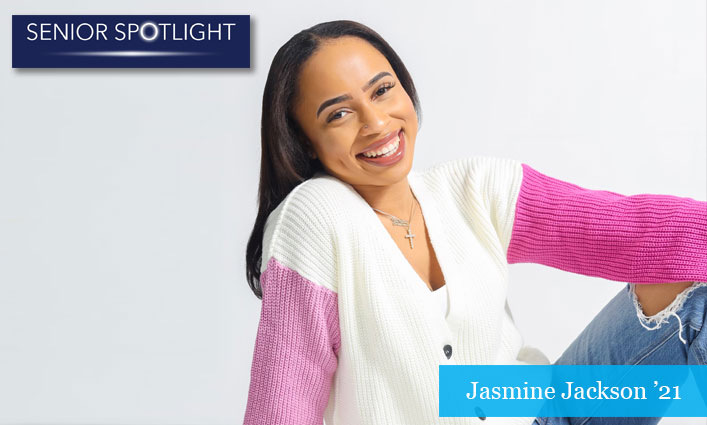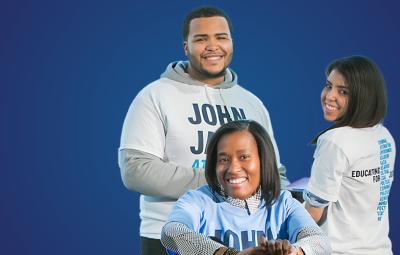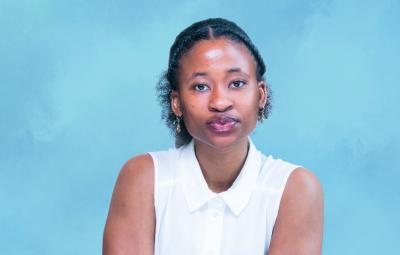
Jasmine Jackson ’21, a graduating senior from Teaneck, New Jersey, who majored in Forensic Psychology, is already enrolled in a Mental Health Counseling master’s degree program at Fordham University. She’s also lined up a job as a Communications Coordinator at Fordham’s Student Association for Mental Health. What does she attribute to reaching these milestones? In a word, CUSP, the Completion for Upper-division Student Program at John Jay College.
“Without CUSP, I definitely wouldn’t be where I am right now,” says Jackson. “Without CUSP, I’d be experiencing a lot of stress and anxiety, just trying to navigate career and grad school obstacles all by myself. But with CUSP, I had a mentor that motivated me, guided me, and made sure I was on track to reach my goals. I also took every workshop CUSP offered—interviewing skills, cover letters, applications, I needed it all. CUSP made sure that I was prepared and ready for life after graduation, and I couldn’t be more thankful for it.” We sat down with Jackson to learn more about her journey and the positive impact that CUSP had on her life.
“CUSP made sure I was prepared and ready for life after graduation, and I couldn’t be more thankful for it.” —Jasmine Jackson
Growing Up and Feeling Isolated
Jackson’s parents were from the Bronx, but when it came time to start a family, they decided to move to New Jersey. “They gave me a very good childhood, but Teaneck is a predominantly white neighborhood, and I was the only African-American girl in my elementary school. I felt like I stuck out like sore thumb,” Jackson recalls. “I was bullied a lot, I didn’t have too many friends, and my self-esteem was pretty low. I was having trouble fitting in and I was going through an identity crisis.” By the time she reached middle school her parents intervened and found a fantastic therapist for Jackson to visit. He showed her how to accept herself and better understand the strong emotions she was feeling. “My therapist had a heavy impact on me,” she says. “Talking to him was a turning point in my life. That’s when I decided that I wanted to do something in the mental health field. I had this great support system with my parents and my therapist, and they made me want to support other people who were feeling isolated.”
“Since I was in the eighth grade, I wanted to come to John Jay College.” —Jasmine Jackson
Coming to John Jay
“Since I was in the eighth grade, I wanted to come to John Jay College,” says Jackson about her dream school, but the road getting to John Jay took a few detours. “I applied three times before I got in,” she says with a laugh. “I had a good GPA, but I was a terrible test taker.” At first, she enrolled in SUNY Canton, then the Borough of Manhattan Community College, and finally, after finding the CUNY Justice Academy—a program that puts you on track to get a bachelor’s degree at John Jay once you complete a CUNY associate degree—she walked into her dream school. “I remember the day that I got into John Jay like the back of my hand. My friend was dying my hair blond and I got an email saying that I was accepted. I started screaming and jumping around so much that my hair color didn’t come out perfect.”
After settling into the College, Jackson’s passion for mental health started to deepen when she took classes with Counseling & Human Services Associate Professor Katherine Stavrianopoulos, Ph.D. “She was amazing. Her curriculum on intimate relationships was phenomenal. I still get chills just thinking about the intensity of what I learned in her classes.” At Stavrianopoulos’ suggestion, Jackson minored in Counseling and started looking into grad schools.

“CUSP knew what they were doing when they paired me up with my mentor. He walked me through submitting grad school applications, did mock interviews with me, and advised me on which grad schools to apply to. Because of my CUSP mentor, I got into four grad schools.” —Jasmine Jackson
Getting the CUSP Advantage
Now that Jackson had a specific career ambition fully in her sights—and she was coming to the end of her John Jay journey—she needed a strong mentor who could put her directly on the path to becoming a mental health professional. That’s where CUSP stepped in. “I filled out this whole mentor matching survey. The idea was that they would match you up with a mentor in your field who could meet with you at least once a month and give you advice,” says Jackson. Lucky for her, she was matched with psychologist and alumnus Jeffery Bass Ph.D., B.A. ’96, M.A. ’98, who made it his mission to help get Jackson into grad school. “CUSP knew what they were doing when they paired me up with my mentor. He walked me through submitting grad school applications, did mock interviews with me, and advised me on which grad schools to apply to. Because of my CUSP mentor, I got into four grad schools. Jeffrey was hands down the best possible mentor I could have had.”
“When you’re like me, the first in your family to go to graduate school, any guidance is priceless. Having CUSP in my life showed me the possibilities that my life could hold. They showed me the way with firsthand knowledge.” —Jasmine Jackson
With grad school in place, Jackson started to worry about finances, but Bass eased her mind. He explained all the ins and outs of job postings and HR practices; he even crafted a script for her to say when she felt anxious during a job interview. “I met with Jeffrey several times, for hours, going through the job interview process. His advice was so practical. When I didn’t know how to explain to a possible employer a timing issue I was facing, he said, ‘Don’t stress about it. If they really want you, they’ll wait a few weeks.’ And he was right. I love the mentor/mentee relationship that we’ve been building and I know it will continue long after I graduate.”
Wanting to get the full benefit of her CUSP experience, Jackson signed up for every CUSP workshop that was offered. “The CUSP team thought of everything, each detail of what we’d need going forward was considered,” says Jackson. “How you send an email. What your signature should be. How to network with people. How to understand the difference between fields like social work and mental health. How to address a cover letter when you don’t have an address. They were covering things that I didn’t know I needed to know.”
Jackson has a lot of pride in being a CUSP graduate, and she plans on being a CUSP alumni mentor one day herself. “When you’re like me, the first in your family to go to graduate school, any guidance is priceless. Having CUSP in my life showed me the possibilities that my life could hold. They showed me the way with firsthand knowledge.”



